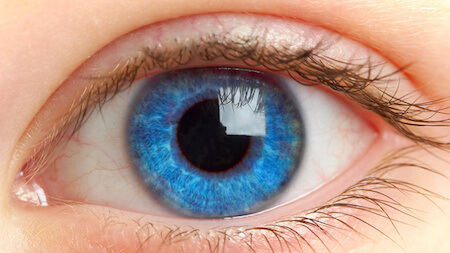Most of us use our eyes every single day; even many people who are blind experience some level of vision, even if it is just patterns of light. That said, a lot of us take our eyes for granted and never think about how our eyes and our sight works. Truth is, there a lot of weird and wonderful things to learn about our eyes, from eye color to the types of tears we cry.
Eye Color
- The science of eye color is fascinating; did you know that experts believe that in the beginning of human history, all eyes were brown?
- Blue eyes are actually a genetic mutation, making those baby blues extra special.
- The color blue is actually not even present in the iris - the illusion of blue eyes is created by wavelengths of light.
- Eye color is genetically inherited, and the tendency for blue eyes is a recessive gene, meaning that even if both your parents have blue eyes, there is still a chance that you are brown-eyed. As a result of this, fewer and fewer blue-eyed children are being born in North America.
 Having blue eyes can make you more sensitive to light than those with brown eyes!Courtesy of dailystormer.com
Having blue eyes can make you more sensitive to light than those with brown eyes!Courtesy of dailystormer.com
Nearsightedness and Farsightedness
- Nearsightedness and farsightedness are common reasons for needing glasses or contact lenses.
- If you are nearsighted, it is probably because your eye is longer than average, which makes you see better when looking close at something but not able to see clearly when looking at a far-away object.
- Farsightedness is basically the opposite; if your eye is shorter than average, you typically see things better at a distance than up close. These conditions are very common among people of all ages.
 Don't be afraid of glassesCourtesy of lerasblog.com
Don't be afraid of glassesCourtesy of lerasblog.com
Tears
- Don't be embarrassed; everyone cries sometimes! Really, though, in some form or another tears are an ever-present part of most people's lives, and not just because of emotional reasons.
- When something gets stuck in your eye, your eye will naturally respond by creating tears in an effort to flush out the foreign object.
- The tears that lubricate your eyes and the tears that come out when you have something in your eye are pretty similar, but what's really different is those tears that you cry when you are heartbroken, incredibly happy, or in physical pain.
- These emotional tears actually have a different chemical make-up than the others!
 We all cry sometimes!Courtesy of proceeder.eu
We all cry sometimes!Courtesy of proceeder.eu
Our eyes are a hugely complex part of our bodies. They allow our sight, have more unique characteristics even than a fingerprint, and even help us find emotional release.
Have Your Say!
If you could have any eye color, what would you choose? Share with our Kidzworld readers!

































